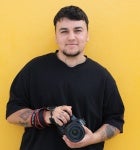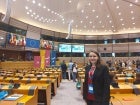Breadcrumb
Stories
Topic
- Show all (1287)
- Gender, culture and society (-) (12)
- Training (-) (10)
- Capacity development (-) (2)
- Ending violence against women and girls (72)
- Gender equality and women’s empowerment (45)
- Anti-violence interventions (42)
- Gender discrimination (38)
- Gender equality and inequality (38)
- Domestic violence/interpersonal violence (36)
- Access to justice and legal protection (34)
- Legal assistance (30)
- Laws, legislation (27)
- Primary prevention (25)
- Gender-responsive budgeting (24)
- Sexual harassment (24)
- Feminicide/femicide (23)
- Service delivery (23)
- Economic empowerment (22)
- Rape/sexual assault (21)
- Shelters (21)
- Employment (20)
- Rural women (19)
- Entrepreneurship (18)
- Decision-making (16)
- Youth (16)
- Gender power relations (15)
- Women’s rights (15)
- COVID-19 (14)
- Financing for gender equality (13)
- Gender mainstreaming (13)
- Civil society (12)
- Men and boys (masculinity) (12)
- Political empowerment (12)
- Access to basic services (11)
- Adolescents (11)
- Beijing Platform for Action (11)
- Businesses and foundations (11)
- Girls (11)
- Human rights (11)
- UNiTE campaign (11)
- Civil society participation (10)
- Peace and security (10)
- Safe Cities and Safe Public Spaces (10)
- Women with disabilities (10)
- Convention on the Elimination of All Forms of Discrimination against Women (CEDAW) (9)
- Financial resources (9)
- Gender stereotypes (9)
- Information and communications technology (ICT) (9)
- Leadership and political participation (9)
- National planning (9)
- Partnerships (9)
- Governance (8)
- Innovation and technology (8)
- Institutional mechanisms (8)
- Peacebuilding (8)
- Social protection (8)
- Women farmers (8)
- Citizen engagement (7)
- Gender statistics (7)
- Generation Equality (7)
- Government contributors (7)
- Productive resources (7)
- Religion (7)
- Science and technology for development (7)
- Sports (7)
- Trafficking/sexual exploitation (7)
- Women’s movements (7)
- 2030 Agenda for Sustainable Development (6)
- Child marriage (6)
- Communications and media (6)
- Electoral systems and processes (6)
- Lesbian, gay, bisexual, transgender, intersex (LGBT) rights (6)
- Markets (6)
- Political violence (6)
- Sex-disaggregated data (6)
- Sustainable Development Goals (SDGs) (6)
- Traditional media (6)
- Unpaid work (6)
- Accountability (5)
- Gender data production and collection (5)
- Governance and national planning (5)
- New media (5)
- Rural development (5)
- Constitutions and legal reform (4)
- Gender data gaps (4)
- Gender data use and accessibility (4)
- Gender wage gap (4)
- Health (4)
- Intergovernmental processes (4)
- Land and property (4)
- Media leadership (4)
- Poverty (4)
- Public administration (4)
- Rule of law (4)
- Schooling (4)
- Accountability in the UN system (3)
- Climate change (3)
- Crisis response and recovery (3)
- Education (3)
- Environmental protection (3)
- Gender equality indicators (3)
- Health care services (3)
- Inheritance rights (3)
- Living conditions (3)
- National mechanisms (3)
- National statistical systems (3)
- Parliamentary development (3)
- UN Security Council resolution 1325 (3)
- UN system coordination (3)
- Coordination, knowledge management (2)
- Disaster risk reduction (2)
- Food security (2)
- Fundamental freedoms (2)
- Fund for Gender Equality (2)
- Harmful practices (2)
- Humanitarian action (2)
- Human rights–based approach (2)
- Macroeconomic policies (2)
- Monitoring and evaluation (2)
- Planning and monitoring (2)
- Sexual and reproductive health and rights (2)
- UN Security Council resolutions (2)
- Urban development (2)
- Åsa Regnér, Deputy Executive Director for Policy, Programme, Civil Society and Intergovernmental Support (1)
- Children’s rights (1)
- Commission on the Status of Women (1)
- Executive Director (1)
- Financial and economic crisis (1)
- Green economy (1)
- Literacy (1)
- Local development (1)
- Maternal health (1)
- Migration (1)
- Monitoring, evaluation and reporting (1)
- Peace processes (1)
- Public sector reform (1)
- Sexuality (1)
- Temporary special measures, affirmative action (1)
- UN Trust Fund to End Violence against Women (1)
Country
1 - 20 of 24 Results
Pagination
Date:
More than 40 women entrepreneurs participated in the “Women’s Entrepreneurship EXPO 2024” satellite event, held for the second consecutive year in Tirana, Albania, on November 18-19, 2024.
Date:
Through the UN Joint Programme and UN Women’s intervention, nearly 500 women and children received support with healthcare, legal aid, counseling, vocational training, and housing, resulting in 69 women securing employment and over 250 families receiving rental assistance in Albania.
Date:
The media forum provided a dynamic space for knowledge exchange, interactive sessions, and collaboration with gender and human rights experts. Journalists were equipped with new tools to report on sensitive issues with accuracy and inclusivity, challenge harmful stereotypes, and adopt innovative approaches.
Date:
This innovative methodology, introduced by ESD Albania with the support of UN Women and funding from the Swedish Government, aims to prevent violence and reduce bullying in schools. This is the story of a dedicated teacher and her students at “Karl Gega” High School in an Albanian village, and how ESD has transformed their lives.
Date:
David Cuka, a 31-year-old trailblazer from Tirana, Albania, joined the UN Women's "Imagine" campaign aiming to raise awareness and challenge cultural stereotypes and gender-based discrimination in Albania and the Western Balkans.
Date:
Young peacebuilders from the Western Balkans participated in a two-day training to strengthen their capacities on the Women, Peace and Security (WPS) and Youth, Peace and Security (YPS) agendas.
Date:
On the occasion of International Women’s Day, UN Women and students of the Faculty of Social Sciences in Albania launched a campaign to tackle gender stereotypes and discrimination, in partnership with Sophie Caffe, a popular coffee shop chain in the country. The initiative won first prize in a student “bootcamp” organized by UN Women as part of the joint UN programme "Leave No One Behind”.
Date:
Ema Meçaj is a 19-year-old activist from Albania, currently pursuing a degree in medicine at the University of Medicine in Tirana. A dedicated advocate for human rights, gender equality, and climate action, she recently co-moderated the regional youth consultation from December 13 to 14, 2023, in preparation for the 68th session of the Commission on the Status of Women (CSW68). In this Interview, Ema Meçaj reflects on the youth consultations, outlines the key issues for this year’s CSW, and emphasizes the vital role of youth in advancing the gender equality agenda.
Date:
The UN Resident Coordinator’s Office and UN Women Albania co-organized an online training on the Gender Equality Marker (GEM) and the Human Rights Marker (HRM). The overall aim of the training was to ensure that the GEM and HR Marker scoring will be accurate for the upcoming Joint Work Planning cycle, which will cover the 2024-2025 period. The training was also an important step for ensuring the accuracy of markers is instrumental for adequately score UNCT SWAP Indicator 6.1, which verifies whether adequate resources for gender mainstreaming are allocated and tracked.
Date:
Toxic masculinities, rigid gender stereotypes, hate speech and media representation of traditional gender roles increase the risk of violence, particularly against women, which is considered to be the most widespread form of violence throughout the region – according to a new research supported by UN Women.
Date:
After six years of dedicated work, the UN Women regional programme Ending Violence Against Women and Girls in the Western Balkans and Turkyie “Implementing Norms, Changing Minds” comes to a close. Civil society organizations, government representatives and partners met to take stock of achievements, challenges, and the way forward.
Date:
Fake news, misinformation, and hate speech are causing significant harm to mental health, exacerbating social divisions, and eroding trust in public institutions throughout the Western Balkans. Marginalized groups, particularly women and girls, are frequently targeted by hate speech. Of particular concern is the role of social media, which has become a fertile breeding ground for disinformation.
Date:
Gjeline Doda, from Lezha, northwest Albania, is one of the first educators in Albania certified as an Empowerment Self-Defense (ESD) instructor in 2021. Apart from teaching high school math, which she has been doing for almost 15 years, she is now working to empower and teach personal safety to a new generation by boosting students’ self-esteem and communications skills to prevent and mitigate the risk of violence.
Date:
130 youth participated in UN Women consultations organized in Albania, Bosnia and Herzegovina, Kosovo*, Serbia, and North Macedonia.
Date:
On 24 February 2023, the Government of Albania and UN Women hosted a sub-regional consultation for the Western Balkans and Türkiye, in preparation for the 67th session of the Commission on the Status of Women (CSW67). The consultation provided an opportunity to discuss the gender gap in digital access, women's underrepresentation in certain professions, women’s entrepreneurship, decision-making in the digital transformation, as well as online discrimination and violence in the region.
Date:
UN Women in Albania, the Office of the UN Resident Coordinator (RCO), and the UN Women Regional Office for Europe and Central Asia organized a training on Monitoring & Evaluation and Gender Data dedicated to UN staff involved in programme management.
Date:
Over 1200 students around Albania were trained boosting their the self-esteem and strengthening their safety.
Date:
UN Women in collaboration with the Municipality of Kamza, a town 11 km from the capital Tirana, organized an awarding event with 16 women participants of the Women’s Small Business Program. They presented their business ideas and plans in front of a professional jury and business representatives following five months of training and coaching.
Date:
Gresa Hasa is the co-founder and editor in chief of ‘“Shota’” magazine, the first progressive feminist magazine in Albania. She is a strong advocate for women’s rights and has long been on the frontlines of the feminist and student movements in the country.
Date:
The initiative aims to engage young creators and artists from all around Albania practicing photography and illustration, who will use their artworks to convey messages and help spark a conversation around this theme.
1 - 20 of 24 Results

















